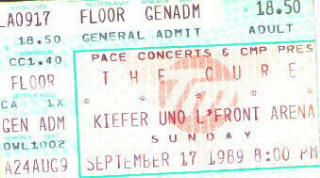
Cure Heads for the Top
by Rob Rioux (New Orleans Times-Picayune-9/15/89)
As The Cure's "Disintegration" tour winds across America,many fans are
concerned about the band's status.Over the past several months,rumors have
been circulating that this is the last Cure tour,and that "Disintegration"
is the final Cure album.
In a recent telephone interview,keyboard player Roger O'Donnell was
confident that The Cure will be releasing at least one more album.The
band's three shows in London,he said,were recorded for a possible live
album early next year.And as far as touring goes, "every tour The Cure does
is the final tour," he said,referring to vocalist Robert Smith's periodic
declarations that each tour will be the final one. "It keeps things more
interesting and alive that way."
Apparently,fans aren't taking the risk.The first date on The Cure's 27-city
trek across the states was at Giants' Stadium in New Jersey,where the band
played to 40,000 people. "It was quite a shock,really," said O'Donnell."We
had been at sea for five days.The stadium was too big for us to take it all
in.We've decided that we don't like playing stadiums that large."
Initially,"Disintegration" seemed to have no immediate candidates for
singles,as opposed to the band's 1987 smash "Kiss Me Kiss Me Kiss Me,"
which bore three.
"'Lullaby' was to be the first American single (from "Disintegration"),but
we were on a film soundtrack ("Lost Angels") with 'Fascination Street,' so
we put that out in America instead," said O'Donnell. "Lullaby" was released
in England,and both songs did remarkably well on their respective
continents,he added.Another hot Cure single,"Love Song," has been
described as a wedding present from Smith to his new bride,Mary.The couple
wed recently after a courtship of more than 10 years.
The Cure's roots stretch back to 1977 in the English town of Crawley,from
whence came the band's first album, "Three Imaginary Boys," which contained
the popular but controversial song "Killing An Arab." When the song was
placed on a 1986 Cure compilation album,several political organizations
protested the song as an anti-Arab statement,although band members explain
it was inspired by a chapter from existentialist Albert Camus' novel "The
Stranger."
After the release of three more Cure albums, "Seventeen Seconds," "Faith"
and "Pornography," rumors of a Cure breakup surfaced.On break from his
duties in The Cure,Smith joined the group Siouxsie and the Banshees as a
guitar player for the albums "Nocturne" and "Hyaena." But Smith regrouped
with the band in 1984 and released "The Top," an album featuring the song
"Give Me It," a Cure live favorite.
The Cure then stabilized for the most successful years of its career.The
album "The Head on the Door" marked the beginnings of widespread fame for
the band.It was followed by "Standing on the Beach," a compilation of The
Cure's earlier work,and then the 2-million seller "Kiss Me."
Smith is the only member of The Cure to survive the 12 years' of changes,
though two of the band's current members appeared in previous lineups.
Guitarist Porl Thompson was an original member of the band in 1977,but had
left by the release of "Three Imaginary Boys," rejoining in 1984 for "The
Top." Bass player Simon Gallup joined the band in 1981,took a two-year
break,and returned to work on "The Head on the Door." Both Gallup and
Thompson have remained in The Cure to date.
The year 1984 also saw The Cure gain drummer Boris Williams,who had been
working with the Thompson Twins.When the band needed an extra keyboard
player for its "Kissing" tour,Williams suggested O'Donnell.
"Boris and I had worked together in the Thompson Twins touring band.I was
contacted about The Cure tour when I was touring with The Psychedelic Furs,
so I had to learn the keyboard parts back in my hotel room," said O'Donnell.
For the past several years,the band has used Tim Pope exclusively as video
director.His efforts are behind some of The Cure's most memorable clips,
including "Why Can't I Be You?," "In Between Days" and "Close to Me."
"Robert feels that Tim can best represent on video what's on his mind at
the time," said O'Donnell.
The European leg of the "Disintegration" tour saw The Cure pull out all the
stops by performing marathon concerts of more than three hours.Cure fans
heard songs that the band hadn't played in years,like "All Cats Are Grey"
and "Fire in Cairo." O'Donnell said that the band's American shows are
usually limited to 2 1/2 hours due to "union restrictions." Even so,he
said, "I think most people who come to see The Cure will hear everything
they want to hear."
WHAT: The rock band in concert.
WHEN: Sunday at 8 p.m.
WHERE: UNO Kiefer Lakefront Arena.
TICKETS: $18.50 from Ticketmaster outlets, or call 888-8181.
Back

